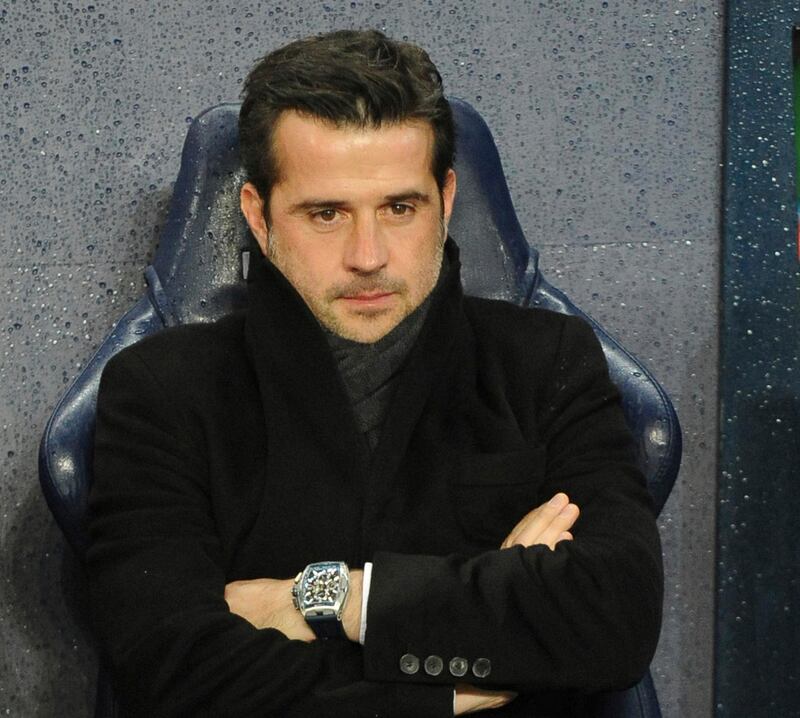When the axe fell, Everton were 18th and Watford in the top six, three places above Liverpool. That was last October, when Ronald Koeman was dismissed and Marco Silva targeted.
While much has changed in the subsequent eight months, with Sam Allardyce hired and fired by Everton, Silva eventually sacked by Watford and a wrangle between the two clubs yet to be resolved, in one respect things have remained frozen in time.
Silva was still Everton’s first choice. Finally appointed, unveiled on Monday, his reign begins in earnest now.
In one respect, his is an easy task: he simply has to be preferable to the unpopular Allardyce. He is starting from a low base: playing better football, displaying less arrogance and antagonising fewer in the support should be comparatively simple.
New training kit 👌 ➕ the boss' ✍️ = 🔥
— Everton (@Everton) June 1, 2018
RT to win training top signed by Marco Silva! #EFC pic.twitter.com/aGc4wCdtm6
Justifying a seven-month pursuit, proving the progressive choice Everton imagined, reversing the direction of a club that spent £200 million (Dh983m) while regressing and becoming a byword for mismanagement: these are tougher tasks.
Breaking into the top six, as Watford did briefly, went from aspiration to pipe dream last season. Yet Everton boast greater resources than the bottom 13: if Silva’s first objective is to pilot them into no-man’s land between differing worlds, the harder bit is bridging a seemingly unbridgeable gulf.
His brief time in England has lent him a reputation as a manager who can make an immediate impact but who has not sustained fine starts. He began with a flurry of home wins at Hull City and, given the paucity of the fare served up at Goodison Park of late, an appeal to Everton is obvious.
🤞 | Sharpy says "hope and optimism" surrounds Blues following appointments of Marcel Brands and Marco Silva.
— Everton (@Everton) June 4, 2018
How excited are you for the new era? 🔵
Column 👉 https://t.co/qDVBa2Btla pic.twitter.com/YDoIqGRaga
He briefly transformed Watford into intrepid travellers which, given Everton’s record on the road in the last 20 months, would represent a welcome change. There is a certain chameleon-like element to his brief tenures: he built from the back at Hull, but produced an enterprising, attacking Watford side that was personified by Richarlison.
By the time he was fired in January, he had come to look a flash in the pan. After Koeman was sacked, his subsequent 15 games produced a mere 11 points. A club was destabilised, a manager unsettled and a side weakened, with the loss of injured midfielder Nathaniel Chalobah especially crucial.
At 40, Silva is starting his sixth managerial job. He has only lasted more than one season at Estoril. Circumstances are a factor and he can look emblematic of a modern game with short attention spans, but he ought to recognise a need to do something substantial, rather than simply club-hopping.
______________
Read more:
[ David Moyes departs West Ham with reputation restored considering the context ]
[ Everton and Sam Allardyce, a club and manager mismatch borne of desperation ]
[ Silva will view Everton as a stepping-stone so club should instead go for Wagner ]
______________
He has made the right noises, placing an emphasis on reconnecting players with supporters after Allardyce seemed to go on a one-man campaign to alienate the fanbase. Yet Silva has to pass a loyalty test himself. His head was turned by Everton so soon into his time at Watford.
Come October, if the Merseysiders are flying and, say, Arsenal or Chelsea are not, can a man of such evident ambition remain focused on events at Goodison Park? If Everton, with their history and identity, like to regard themselves as a destination club, it is hard to shake off the impression Silva may see them as another stepping stone on his swift path to the top.
That drive can be galvanising, and certainly Everton need to raise standards after the wretchedness of last season. Silva offers the sheen of modernity, an injection of ideas and the charisma to carry others along with him, all characteristics that clearly appealed to Farhad Moshiri, Everton’s owner. Yet it has to be underpinned by a commitment.
The acid test lies not in slick words or a flying start, but in displaying the longevity to leave an imprint, not just a fleeting impression.






